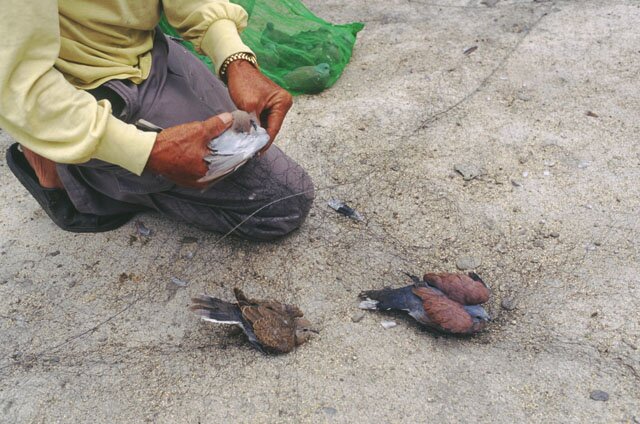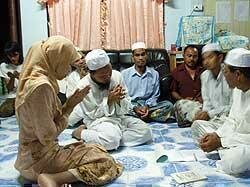BROWSE COUNTRIES/ TERRITORIES
In good company
Michael Ying has the knack of building talented teams who can turn a business around and turn it into an empire.
You might say it is Osama bin Laden that helped to make Michael Ying a billionaire
Ying was already a rich man on September 11, 2001. But he was hitting a glass ceiling until bin Laden’s men rammed two planes into the World Trade Center in Manhattan.
In 2001, Ying had been running Esprit Far East, a garment maker and retailer listed in Hong Kong, for 17 years. He had set up the company with Susie and Doug Tompkins in 1974.
The Tompkins, who have since divorced, founded Esprit de Corp in the 1960s. It evolved into Esprit Holdings, which has become an icon in America producing chic casual wear for the under 30 market.
The Tompkins met Ying in 1971. Ying soon became their principal sourcing agent. Three years later they went into partnership through Esprit Far East, which sourced and made virtually all the products carrying the Esprit brand.
It was the classic principal-subcontractor set up. Esprit Holdings held the brands and was responsible for the final design. Most of the sweat work and capital expenditure was carried out by its Far East subsidiary.
It was a one-sided relationship: for every dollar made by Esprit Far East, Esprit Holdings made many more dollars and carried far less risk.
Michael Ying had been trying to change the situation for years. He had expanded in Asia and wanted to push aggressively into Europe. But his partners in the US had different ideas. By the mid-1990s, the Tompkins had been replaced by a group of investors who placed a succession of CEOs in a directionless Esprit Holdings. By then Ying had bought up 63% of Esprit Holdings, but his hands were tied by the minority shareholders. Ying found it difficult to work with them and had wanted to buy them out, but both sides could not agree on a price.
Then came 9/11. Confidence in America plummeted. The middle class, the mainstay of Esprit, cut down their buying. The bankers were calling back their credit lines. The shareholders of Esprit Holdings started to panic. When Ying made them an offer, they grabbed it with both hands. In March 2002, six months after the catastrophic event, Ying paid US$150 million for the balance 37% of Esprit Holdings and became its sole owner. He had gained full control of the brands he had been associated with for three decades.
Things moved fast after that. Ying discarded most of Esprit Holdings, retaining the brands, which he moved to Hong Kong. He also shifted the focus of Esprit out of the US, where it was reeling under the attack of the likes of Gap and The Limited, to Europe.
Ying, Doug Tompkins once remarked, is not an expert in any particular area of retailing. But he is good at employing people who are. Ying proved him right when he hired Heinz Jurgen Krogner-Kornalik, a German with a strong textile background, in 1995.
Ying is a micro-manager. He is famous for making surprise visits to his stores (which took up a lot of his time, given that Esprit has more than 7,000 of them in nearly 48 countries) and making minute adjustments to layouts and even how the clothing is stacked.
But when it comes to the big picture, he takes a different approach. Heinz Krogner was given a free hand to develop the European market while Ying stayed on in Hong Kong. “I wanted him to feel that there was nobody, including me, that would interfere with him in what he planned to do,” Ying explained once. “Many people enjoyed working in Esprit because we respect their ability to act independently,” he added.
It worked with Krogner. In a few years, Germany had taken over the US as Esprit’s biggest market. Today half of its revenue and the bulk of its profit come from Europe. For his efforts Krogner was made CEO in 2002. He had also become a rich man—by one estimate he was given more than HK$60 million in the first few years of his employment.
Krogner’s reward is nothing compared to what Ying had taken out of Esprit after he gained full control in 2002. A series of share sales had netted the man who came from a lower middle class family and who started his career as an airline reservation clerk nearly US$2 billion in cash and dividends. Today Ying still holds about 8% of the company, worth nearly US$1 billion. The US$150 million he had paid to buy out the minorities of Esprit Holdings has been returned to him many times over.
In September this year Ying announced he would retire in December, with Krogner taking over as chairman. Though he declined to discuss what he would do after that, it is an open secret that Ying is a golf maniac and he has plans to invest in a string of golf resorts in China.
Sometime in June, Ying was spotted flying about in Jiangxi province in his private plane with his second wife, the actress Brigitte Lin. He was inspecting potential investment sites. The trip was supposed to be a low key event. But as his was the first private plane to touch down in the airport of the ancient city of Nanchang, the provincial capital, it received huge publicity not only among the local press, but also the national media. The secret was out of the bag.
Ying, of course, is casting his eyes not only on Nanchang, or even in Jiangxi. His ancestors hailed from Hainan Island, a Chinese province dotted with golf courses. Over-competition has landed many in dire straits and he has been approached many times to h
elp revitalise some of the courses.
If Ying invests, it will probably be a collaborative effort. The man who excels in finding good employees has proved to be even better in finding partners. In Esprit he found the Tompkins. In golf, it is likely to be his golf buddies: Lui Che Woo, chairman of K Wah group, and Edmund Ho, Chief Executive of Macau, among others. In fact, given that both Lui and Ho are heavily invested in casinos—K Wah holds one of the three principal casino licences in Macau—there is a good chance that Ying might also invest in the gaming industry in the former Portuguese colony.
Related Stories:
Login or Register
 Lee Han Shih is the founder, publisher and editor of asia! Magazine.
Lee Han Shih is the founder, publisher and editor of asia! Magazine.
- Asian Dynasties and History
- Conservation of the Environment
- Definition: Culture
- Economy and Economics
- Food and Recipe
- Geopolitics and Strategic Relations
- Health and Body
- Of Government and Politics
- Religion and Practices
- Social Injustices and Poverty Report
- Society, Class and Division
- Unrest, Conflicts and Wars

































 Another Point
Another Point From Jerusalem to the West Bank
From Jerusalem to the West Bank
Comments
Post new comment